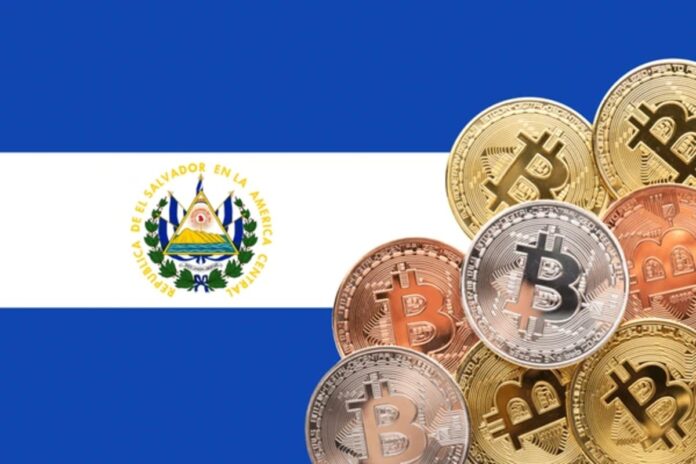- The International Monetary Fund wants El Salvador to change its Bitcoin laws.
- A loan of $1.4 billion is on the line, stirring a dicey situation for the Caribbean nation.
El Salvador known for its unwavering stance on Bitcoin (BTC) has maintained its crypto policies, refusing to amend the Bitcoin law in exchange for a $1.4 billion credit from the International Monetary Fund.
This decision from El Salvador has raised discussions on lessons for Joe Biden, Olaf Scholz, and Emmanuel Macron as they contemplate integrating Bitcoin into their economy.
IMF Withholds $1.4B Credit from El Salvador
According to Blockchain researcher, Collin Brown, the IMF, which generally gives financial support to countries facing economic issues, is reportedly withholding a $1.4 billion credit line that El Salvador needs for debt repayment and other obligations.
🚨Nayib Bukele stands strong with #Bitcoin! 🚨
El Salvador’s push for Bitcoin adoption is reportedly complicating its negotiations with the IMF for credit opportunities. The IMF, seeking changes to the Bitcoin law, is withholding a $1.4 billion credit line crucial for the… pic.twitter.com/LyKV0lF5n3
— Marcel Knobloch aka Collin Brown (@CollinBrownXRP) April 12, 2024
The IMF is pushing for amendments to El Salvador’s Bitcoin law, which designated Bitcoin as a legal tender in the country in 2021, citing concerns about the risks involved with cryptocurrency. The importance of Bitcoin in El Salvador’s economy has now become a defining topic in negotiations between the government and the IMF.
As of now, the discussions have reached a hurdle as the IMF pushes for changes in El Salvador’s Bitcoin stance. Nonetheless, President Bukele remains resolute to support Bitcoin. As previously reported by Crypto News Flash, Bukele has doubled down on his crypto policies since he was reelected in February.
In March, Bukele declared that the country would continue to buy 1 BTC per day until it became unaffordable in fiat currencies. El Salvador has also looked into alternative finance options, such as issuing Volcano bonds pegged to Bitcoin.
Negotiations between El Salvador and the IMF have been scheduled for April 15, with President Bukele’s brother, Ibrahim Bukele designated to oversee the discussions. The outcome of these negotiations will determine if the country will be given the $1.4 billion credit and its capacity to overcome economic issues while remaining committed to Bitcoin.
For other Presidents like Biden, Scholz, and Macron, there are several lessons to draw from the situation regarding El Salvador’s push for Bitcoin adoption. Firstly, it is important that they thoroughly consider the potential outcomes of Bitcoin adoption, both locally and internationally before establishing policies. This includes determining how such actions may affect relationships with international financial institutions such as the IMF.
Furthermore, El Salvador’s courage to stand against the IMF is one to be studied. According to a prior report by Crypto News Flash, the country has seen a slight improvement in employment and foreign direct investment following its Bitcoin push.
El Salvador Ventures Into Tokenized Debt Using Bitcoin
Meanwhile, El Salvador appears not to be slowing down anytime soon with its Bitcoin adoption. In its latest venture, The Hampton by Hilton Hotel financed by Bitfinex Securities, El Salvador’s first registered digital asset is set to utilize tokenized debt through Bitcoin technology, as revealed in a YouTube video from Crypto News Flash.
The initiative seeks to raise $6.25 million by selling tokens on the Bitcoin Layer 2 Liquid Network, providing investors with a 10% return over five years. According to the details, the hotel will have 80 rooms, commercial areas, and amenities including a swimming pool and gym, with token holders obtaining incentives such as free lodging based on their investment size.
Per Bitcoin, it is currently trading at $67,343, down by 4.69% in the past 24 hours, with its market cap standing at $1.3 trillion. While the price of the coin is down, trading volume has increased by 62.7% to $48 billion. This shows a robust liquidity and interest despite the market outlook.
Credit: Source link






















 Bitcoin
Bitcoin  Ethereum
Ethereum  XRP
XRP  Tether
Tether  Solana
Solana  USDC
USDC  Dogecoin
Dogecoin  Cardano
Cardano  Lido Staked Ether
Lido Staked Ether  TRON
TRON  Chainlink
Chainlink  Avalanche
Avalanche  Wrapped Bitcoin
Wrapped Bitcoin  Wrapped stETH
Wrapped stETH  Stellar
Stellar  Sui
Sui  Hedera
Hedera  Toncoin
Toncoin  Shiba Inu
Shiba Inu  Litecoin
Litecoin  WETH
WETH  Polkadot
Polkadot  Hyperliquid
Hyperliquid  LEO Token
LEO Token  Bitcoin Cash
Bitcoin Cash  Bitget Token
Bitget Token  Uniswap
Uniswap  USDS
USDS  Wrapped eETH
Wrapped eETH  Ethena USDe
Ethena USDe  Pepe
Pepe  NEAR Protocol
NEAR Protocol  MANTRA
MANTRA  Official Trump
Official Trump  Ondo
Ondo  Aave
Aave  Aptos
Aptos  Internet Computer
Internet Computer  Monero
Monero  WhiteBIT Coin
WhiteBIT Coin  Ethereum Classic
Ethereum Classic  Mantle
Mantle  Bittensor
Bittensor  Cronos
Cronos  POL (ex-MATIC)
POL (ex-MATIC)  Dai
Dai  OKB
OKB 
